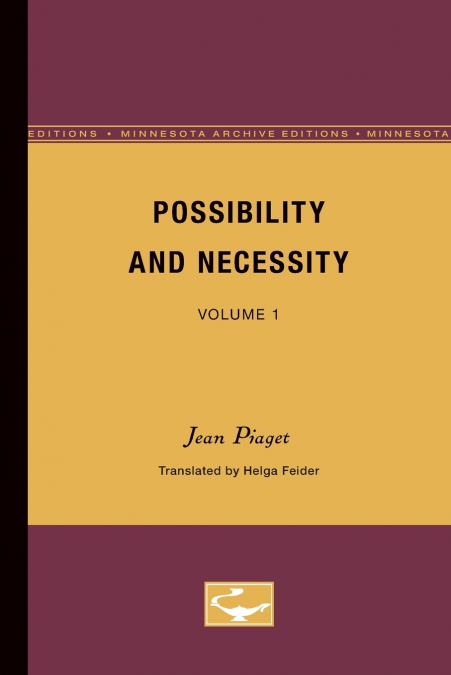
 Donde los libros
Donde los libros
 Librería 7artes
Librería 7artes
 Librería Elías (Asturias)
Librería Elías (Asturias)
 Librería Kolima (Madrid)
Librería Kolima (Madrid)
 Librería Proteo (Málaga)
Librería Proteo (Málaga)
Possibility and Necessity was first published in 1987. Minnesota Archive Editions uses digital technology to make long-unavailable books once again accessible, and are published unaltered from the original University of Minnesota Press editions.Jean Piaget was preoccupied, later in life, with the developing child’s understanding of possibility-how the child becomes aware of the potentially unlimited scope of possible actions and learns to choose among them. Piaget’s approach to this question took on a new openness to real-life situations, less deterministic than his earlier, ground-breaking work in cognitive development. The resulting two-volume work-his last-was published in France in 1981 and 1983 and is not available for the first time in English translation. Possibility and Necessity combines theoretical interpretation with detailed summaries of the experiments that Piaget and his colleagues used to test their hypotheses.Piaget’s intent, in Volume 1, is to explore the process whereby possibilities are formed. He chooses to understand 'the possible' not as something predetermined by initial conditions; rather, in his use of the term, possibilities are constantly coming into being, and have no static characteristics-each arises from an event which has produced an opening onto it, and its actualization will in turn give rise to other openings. In perceiving that a possibility can be realized, and in acting upon it, the child creates something that did not exist before.To observe this process, Piaget and his associates devised a series of thirteen problems appropriate for children ranging in age from four or five to eleven or twelve; they were asked to name all possible ways three dice might be arranged, for example, or a square of paper sectioned. The experimenters had two primary aims-to discover to what extent the child’s capacity to see possibilities develops with age, and to determine the place in cognitive development of this capacity-does it precede or follow the advent of operational thought structures? In charting this process, Piaget discerns a growing interaction between possibility and necessity. How the child comes to understand necessity and achieves a dynamic synthesis-or equilibrium - between the possible and the necessary is discussed by Piaget and his colleagues in Volume 2, The Role of Necessity in Cognitive Development, also published by Minnesota.